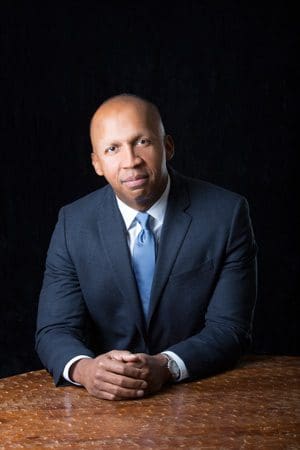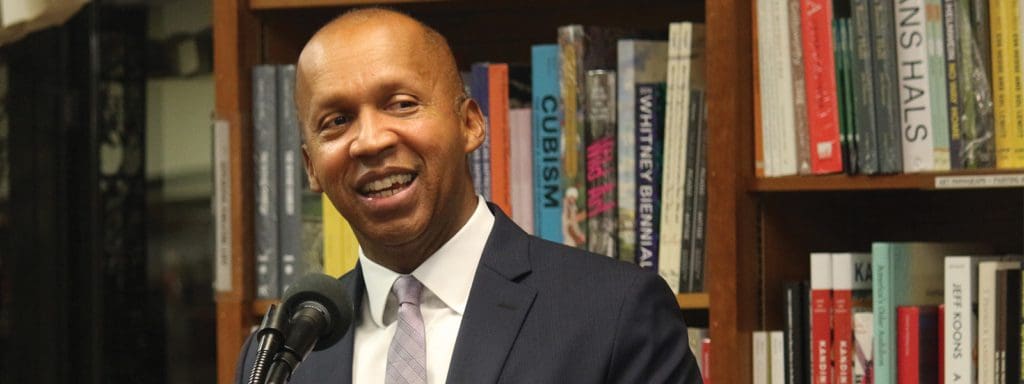By Claire Wellington
2016 John W. Gardner Leadership Award Winner
This summer, ISQ had the opportunity to speak with 2016 John W. Gardner Leadership awardee Bryan Stevenson, a standard-bearer for equality, racial justice, and the rule of law. Bryan is the founder and director of the Equal Justice Initiative (EJI), a nonprofit organization that provides legal representation to indigent defendants and prisoners who have been denied fair and just treatment in the legal system. During our conversation, Bryan spoke of his background and the path he has traveled professionally and personally. He shared his thoughts on the challenges facing our nation, and the role of our sector in building a stronger and more just society. Bryan will receive the Gardner Award on November 18 at the Independent Sector Conference in Washington, DC.
Evolution of a Leader
Growing up in southern Delaware at a time when segregation still held sway, Bryan was an eyewitness to the American legal system’s capacity to deny, as well as to protect, the civil rights of African Americans. Bryan saw the groundwork for his access to a good education laid not only by his family and community, but by lawyers who argued for, and secured, the mandate to desegregate local schools. Bryan described their efforts as “a revelation,” and he grew to understand that lawyers had the capacity to enforce the rule of law and its basic protections on behalf of those who were otherwise perceived to be without power. As a tool used to defeat injustice, Bryan saw the law as a vehicle to give expression to his own desire to advocate for social justice and to address the scourge of racial
inequality.
Bryan used well the opportunities he was given as a young person. He went on to receive a college degree from Eastern University in Pennsylvania, and to graduate from Harvard Law School. During his time in law school, Bryan took the opportunity to gain practical skills through an internship with an Atlanta-based human rights organization that provided legal services to prisoners on death row. Bryan was deeply engaged by this work, describing the experience as pivotal. Throughout his ensuing career, Bryan’s passionate commitment to the plight of the poor, and to people of color, particularly those who have been unjustly treated, has reflected his deepest calling not only as a leader, but as a human being. Having seen his parents, grandparents, and many others close to him endure the legacy of enslavement, Bryan was keen to share his energy, vision, and legal skills with those whose lives could also be so deeply affected by a caring advocate committed to change and the greater good.
Think Strategically and Act Courageously
The path Bryan chose has been marked by constant and hard-fought battles against inequity, bias, and apathy. Yet despite the seemingly endless series of challenges and hardships, Bryan seeks always to focus on hope and, ultimately, victory. Believing doggedly in the causes of right and justice, Bryan spoke eloquently of hopelessness as the enemy of justice, and noted with enthusiasm the tangible difference that can be made by individuals who are both strategic and courageous in pursuing their work. He paid tribute, in particular, to those of whom it was said during the Civil Rights era that “their head is bloody, but not bowed.” Bryan humbly conceded that his head has never been bloodied, but it is clear that his tireless efforts on behalf of the poor and mistreated could easily bow the head of a person of lesser fortitude. When asked how he lifts up and inspires those with whom he works, Bryan observed that he derives power and a renewed spirit from being in closer proximity to the communities, people, and clients he serves. In his view, “[y]ou can’t do problem solving from a distance.”
A More Perfect Union
Reflecting on the state of our nation, Bryan made an eloquent case on behalf of the need for change. Drawing upon the facts and circumstances he confronts daily, he fluidly recounted the appalling statistics on mass incarcerations: an increase in the U.S. prison population from 300,000 individuals in 1972 to 2.3 million in 2016; the more than six million people on probation; and the statistical projection that one-in-three African-American babies is expected to go to prison during their lifetime. Despite these sobering numbers, Bryan remains undaunted and continued to advance the conversation to a place of hope and action.
Believing deeply that to change the world one must have the courage of their convictions, Bryan asserted that we must each carry in our heart an undeniable belief in the value of every human being and their right to be treated with dignity. As a nation, and in our deepest selves, we must each share in and feel the unfairness of what it means to be marginalized and demeaned. We must proceed from a system of belief that accepts such values as the norm, rather than a construct that deems justice and equality for a few, rather than for all, to be acceptable. Bryan argues that we must change the narrative about race, that we must as a nation confront the realities of racial bias, and that it is imperative that we overcome the politics of fear and anger. In the long-run he believes that it is the articulation of a new narrative and the modeling of new behaviors and beliefs that will move us to become the society we seek.
A Vital Nonprofit Sector
Against this backdrop, Bryan took a moment to reflect on our sector and its role in moving us to a more just society and world. In this regard he commented on the salience of mission-driven people and organizations, noting that the advocacy, litigation, and mobilization needed to strengthen our society are advanced by those who have not only a vision, but who also have the opportunity to organize themselves to work towards that ideal. From his vantage point, the changed narratives and outcomes we seek cannot be achieved in the absence of a vibrant nonprofit sector that is motivated to address challenges not because of profit, but because of an inspired vision of a stronger, better and more just society.

Bryan Stevenson, Executive Director, Equal Justice Initiative
Expanding on this, and reflecting on the opportunity for collaboration across sectors, Bryan observed that nonprofits are able to enhance their effectiveness when they are able to leverage institutions in the for-profit sector. In that vein, he referenced the need to be both strategic and tactical in our work, and to be open to engaging purposefully with everyone who can make a difference in our work.
Inspiration to Lead
As a humble and grateful leader, Bryan was quick to acknowledge the inspiration he draws not only from his remarkable and highly talented EJI staff, but he also shared with ISQ that he continues to be inspired by all of those who came before him in the struggle for justice and fairness. In closing, Bryan shared with ISQ a little advice for everyone seeking to take on the challenge of making a difference:
- Get as close to the community you want to serve as you possibly can, and
- Allow yourself to be hopeful and to see yourself part of the solution
In short, to change the world, we must be the change. Inspiring words from a deeply inspiring leader.



